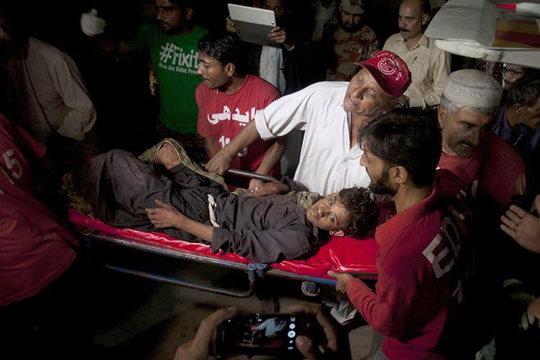Karachi, Nov 13: At least 52 people, including women and children, were killed and more than 100 others injured today in a suicide bombing at a popular sufi shrine in Pakistan's restive Balochistan province, an attack claimed by the Islamic State terror group.

The blast occurred in the remote Hub region in Khuzdar district of the province while devotees were participating in a Sufi dance called "dhamaal" at Dargah Shah Noorani.
At least 52 people were killed and more than 100 have been injured in the blast, rescue officials said. Balochistan Home Minister Sarfaraz Bugti said ambulances and rescue teams had rushed to site.
"The rescue operations are going on and the casualties could rise as some people are still trapped at the place where the blast took place," Bugti said. Some local media reports put the death toll as high as 62.
The target of the attack was the area where devotees perform 'dhamaal'. The blast site is situated some 250 km away from Karachi. The blast happened when about 500 to 600 devotees were present at shrine.
Islamic State group claimed responsibility for the attack via Amaq news agency.
"35 dead and 95 wounded Shiite visitors in...operation attack by the Islamic State fighter that targeted a shrine in a city in Balochistan," the agency said.
The Express Tribune quoted police sources as saying that the blast was a suicide attack carried out by a 14-year-old boy. Colonel Junaid Kakar of the Frontier Corps also told the media that it appeared to be the work of a suicide bomber.
"All evidences point to a suicide bombing," he said. Rrescuers were facing difficulty in accessing the site as the shrine is located in a remote area. Women and children were among those killed in the blast.
"The shrine is located some 250 kilometres from Karachi in the remote mountains of Uthal and our vehicles have been dispatched there to carry out rescue operations and shift the injured to the hospitals," said Hakeen Lassi, an official of the Edhi Trust Foundation.
Local tehsildar Javed Iqbal said security arrangements at the shrine were not proper.
"It is sad that although thousands of devotees from Karachi and other parts of the country visit the shrine everyday but there are no medical emergency facilities or ambulances at the site," he said.
He said the devotees take part in the 'dhamaal' everyday after sunset and the blast took place close to where they were dancing inside the compound of the shrine.
President Mamnoon Hussain and Prime Minister Nawaz Sharif strongly condemned the bomb blast and directed authorities to speed up the rescue activities.
This is the third major incident of a bombing in the province since August. In August, about 70 people were killed in a suicide bomb attack outside the civil hospital in the provincial capital Quetta. Last month, 64 police cadets and two army men were killed when three terrorists raided a police training centre in Quetta.






Comments
Add new comment